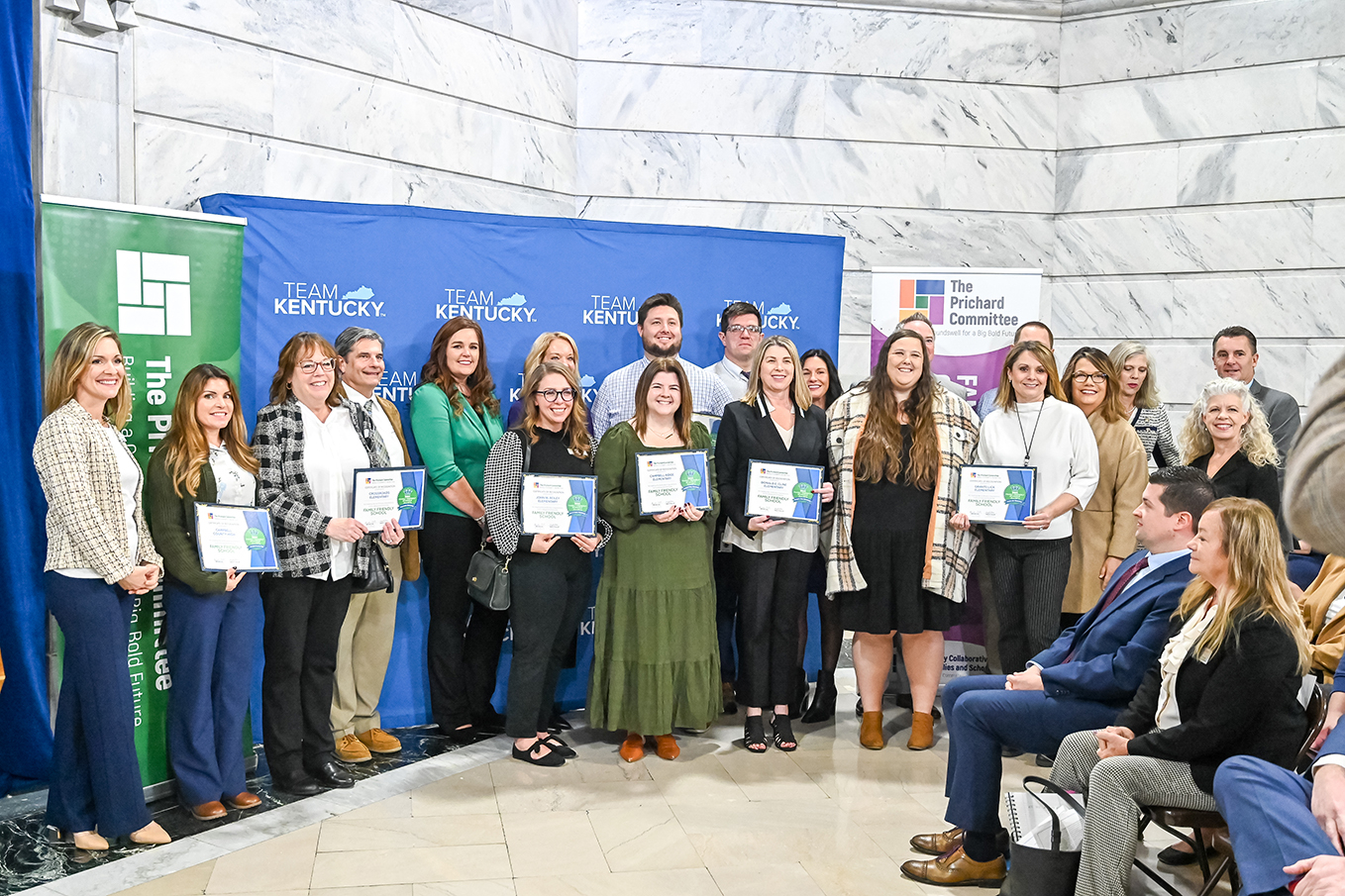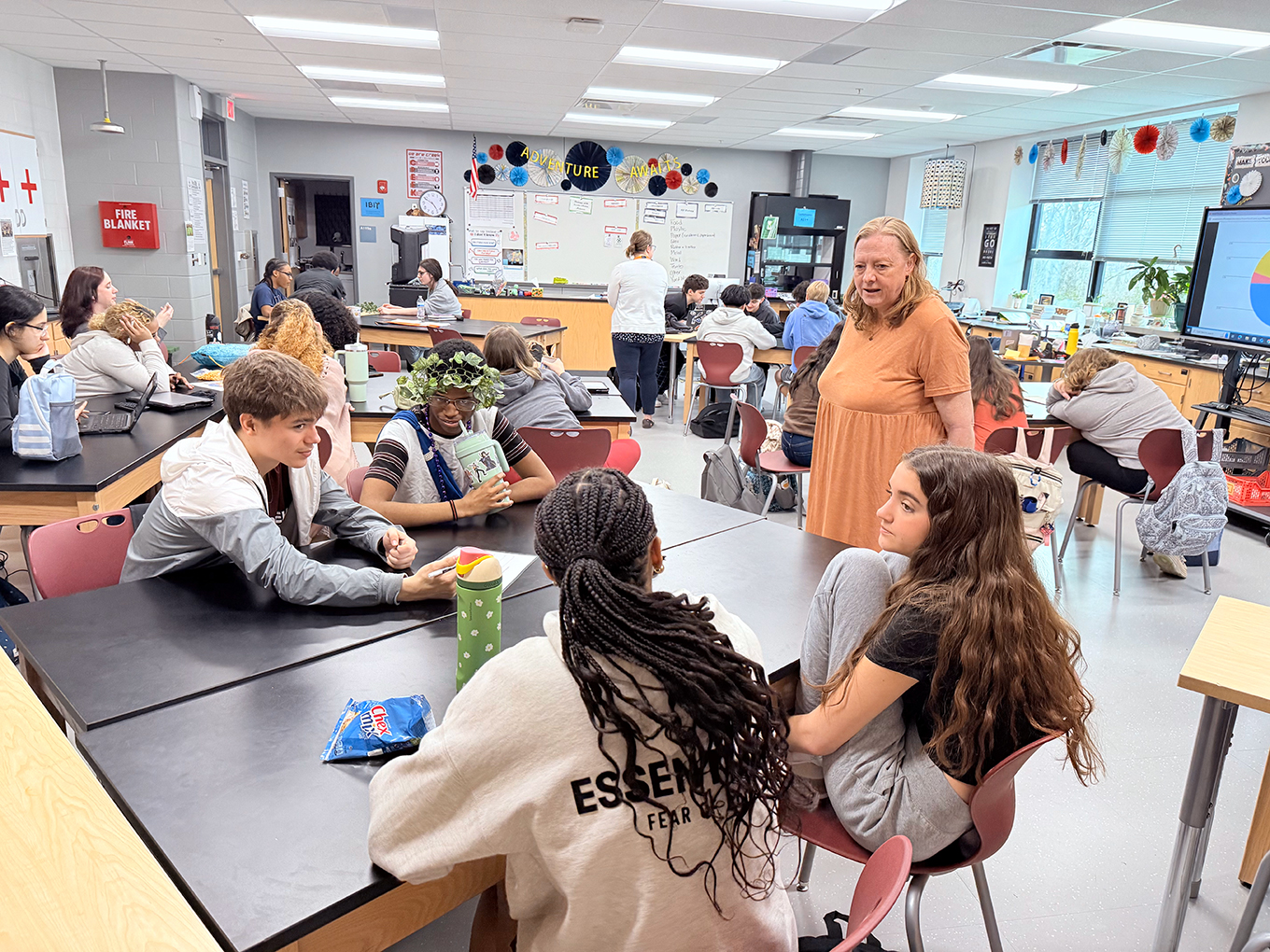
Angela Gunter
By Angela Gunter
angela.gunter@education.ky.gov
I know it is difficult to fathom that anyone would abandon the glamorous life of analyzing bodily fluids. It might not be everyone’s dream job, but as a medical laboratory technician I enjoyed an interesting career, a flexible schedule and a nice salary. I felt as though my job was important and that I contributed to the care – and possibly saving – of the lives of many ailing fellow humans.
When I began volunteering as a Bible school leader and teacher at my church, however, I realized that I was meant to be a teacher and found a way to turn what I loved to do into my profession.
After returning to college, I reflected upon my experiences and I realized that I had actually been an educator my whole adult life. As a lab tech, I was always dreaming up new and exciting ways to deliver in-services to the nurses; creating, writing and implementing procedure manuals for my co-workers to follow and teaching patients how to monitor their glucose levels and lower their cholesterol levels. I was a teacher and I ran my laboratory like a classroom.
My laboratory background may account for my analytical approach to instruction. I wanted to be able to speak with authority to my seniors about what college English would be like, so I started teaching English 101 at the college level. Learning that so much of introductory college English was focused on critical reading of nonfiction, I included more scholarly nonfiction in senior English.
I wanted to better prepare my students to be successful on their Advanced Placement English exams, so I became a reader-scorer for the College Board. Discussing the scoring and teaching strategies used by other teacher-scorers from across the country helped me refine my curriculum.
My National Board certification process and doctoral dissertation journey were also not just theoretical, but practical studies, addressing the motivation and engagement of adolescent readers in my own classroom and school. One study a colleague and I conducted focused on teaching graphic novels. Although much research had reported that students responded favorably to the format, we found that many of the students who enjoyed reading were distracted by the graphics and preferred traditional texts.
In another study, I obtained a class set of MP3 players and assigned groups the audio versions of classic novels rather than text versions to determine if listening would lead to higher comprehension and engagement. Although students preferred to listen and were more motivated to engage with the audio than text, their comprehension test scores yielded no statistically significant difference. My classroom is very much a learning lab.
One of best parts about the teacher-as-researcher model — aside from the actual student growth results — is that students feel their instruction is done WITH them rather than TO them. My students are always asking me, “So, what theory are we going to test today, Dr. Gunter?” They are excited to participate in ongoing research, knowing that they will be part of an important report published somewhere and potentially used by others to improve teaching and learning.
I have witnessed so much enthusiasm from and success by my students as a result of approaching my professional learning logically and conducting studies in my classroom, that I have made the process my focus for this year as a hybrid teacher leader on special assignment. I teach in the morning, and in the afternoon I work on educational initiatives, including offering support to schools and districts as they create teacher-driven, teacher-led professional learning.
I am studying effective models and programs, compiling resources and listing opportunities for teachers, such as classroom action research grants and collaborative learning experiences that cross the state and the nation. I’m currently working with the Kentucky Student Growth Project, Classroom Teachers Enacting Positive Solutions and the Kentucky Text Set Project – three collaborative groups of teachers that are implementing research-based instruction in their schools. My goal is to ensure every teacher has access to such resources, opportunities, and partnerships.
As a lab tech, a mistake on my part could have potentially killed one person. As a teacher, I could kill the drive and inspiration of 180 students every year. A bit dramatic, yes, but this classroom learning laboratory is serious business. While it might be perceived that a career in the medical field offers a bit of prestige, I’ve never experienced more respect and admiration than I do now as a teacher. Hardly a day goes by that I’m not thanked by a student, a colleague, an administrator or community member for directly helping shape the future of our kids.
When we integrate the best parts of other important professions into our own, the students reap the benefits. We need to equip all educators with the tools that allow them to embrace the logic and methodology of a researcher, analyze their students’ motivations like a psychologist, engage and inspire them like a motivational speaker, all while loving them like a parent. Quite a challenge, Kentucky teachers, but we’re up to it.
Angela Gunter, a National Board certified teacher, teaches AP English language at Daviess County High School and serves as a hybrid teacher leader on special assignment for the Kentucky Department of Education. She holds a doctorate in educational leadership, leads the Kentucky Student Growth Project, is the Kentucky ELA content lead with Student Achievement Partners, a state CTEPS and National Math and Science Initiative trainer, treasurer of the Kentucky Council of Teachers of English and a 2015-17 Hope Street Group teacher fellow.




What a wonderful article, Angie! I had the pleasure of meeting you through KCTE/LA and was always very impressed with your love of teaching. Thank you for sharing this!
This is a cool thing to stumble upon. I had Dr. Gunter as a teacher in High School and she actually taught one of my worst subjects, but I loved her class. We learned in creative, interactive, and fun ways. I particularly enjoyed creating funny videos based on books that we read for the class. She pushed us to learn while also caring about us and making things fun. She was one of the best teachers I’ve ever had.
Way to go Dr. Gunter!
You had me at that first line! Our experiences in other professions invariably enhance our teaching.
Excellent article Angie! Your students are indeed blessed to have you as a teacher. The State of Kentucky is very fortunate to have you as a representative. Union County is proud of one of their own making such a difference in students lives! God bless you.
Wow! What a credit to the community of lives in general. Beautiful person inside and out,with a true zest for life. Well written.